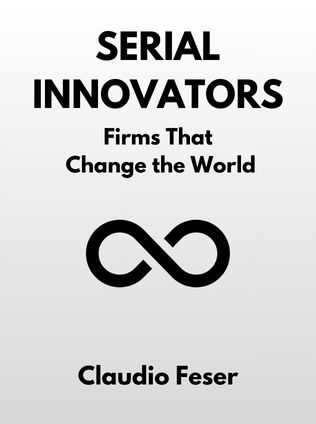
Serial Innovators
Firms That Change the World
By Claudio Feser
Published 11/2011
About the Author
Claudio Feser is a distinguished leader at McKinsey & Company, heading the McKinsey CEO Network, which specializes in CEO training and coaching. With extensive experience advising CEOs of prominent global companies, Feser has garnered insights into the intricacies of corporate strategy, leadership, and innovation. His previous roles, including managing McKinsey's offices in Switzerland and Greece, have provided him with a broad understanding of different business cultures and environments. Feser is recognized for his expertise in fostering organizational change and guiding firms toward sustainable growth.
Main Idea
"Serial Innovators: Firms That Change the World" by Claudio Feser explores the concept that companies, similar to living organisms, experience a life cycle consisting of birth, growth, maturity, and eventual decline. The book delves into the factors that cause firms to stagnate and fail, such as organizational rigidities and cultural lock-ins. Feser proposes a model for creating adaptive, innovative organizations that can continuously reinvent themselves and create lasting value. The book serves as a roadmap for building resilient firms capable of navigating the complexities of modern markets and achieving long-term success.
Table of Contents
- Introduction
- Part I: The Ephemeral Nature of Firms
- Part II: Individual Rigidities
- Part III: Organizational Rigidities
- Part IV: Serial Innovators
- Beyond Business: The Medici, Oxford, and the Catholic Church
- Legacy Through Leadership
Introduction
In the introduction, Feser highlights the intense pressure on modern business leaders to maintain profitability and create value. Despite their best efforts, many firms experience short-lived success, often failing to sustain value creation over the long term. The book opens with a stark statistic: the average life expectancy of a firm is around 15 years, and only a small fraction survive beyond 50 years. Feser compares firms to biological organisms, noting that they are born, grow, mature, and eventually face decline or death. This analogy underscores the natural life cycle that firms undergo and sets the stage for a deeper exploration into why some firms fail while others succeed in becoming serial innovators.
Part I: The Ephemeral Nature of Firms
In this section, Feser examines the life cycle of firms, detailing how they initially thrive on innovative ideas but gradually lose their vitality. As firms grow, they often develop rigid structures and processes that hinder their ability to adapt to changing markets. Feser introduces the concept of "corporate aging," where firms become less agile and more bureaucratic over time. He cites research by economists Claudio Loderer, Klaus Neusser, and Urs Waelchli, who found that the performance of firms generally deteriorates with age. According to their study, only a small percentage of firms survive beyond 30 years, and an even smaller fraction make it past 50 years.
"The life expectancy of firms is much shorter than that of humans. Only a few firms manage to survive and thrive over the long term." — Claudio Feser
Corporate Life Cycle
Feser outlines the typical stages of a firm's life cycle: inception, growth, maturity, and decline. During the early stages, firms are characterized by high levels of innovation and adaptability. However, as they mature, they often become complacent, relying on established products and processes. This leads to a decline in innovation and an inability to respond to market changes. Feser emphasizes that understanding this life cycle is crucial for business leaders who wish to build organizations that can endure and thrive in the long run.
Sign up for FREE and get access to 1,400+ books summaries.
You May Also Like
Rich Dad Poor Dad
What the Rich Teach Their Kids About Money - That the Poor and Middle Class Do Not!
By Robert T. KiyosakiFreakonomics
A Rogue Economist Explores the Hidden Side of Everything
By Steven D. Levitt and Stephen J. DubnerThe Lean Startup
How Today's Entrepreneurs Use Continuous Innovation to Create Radically Successful Businesses
By Eric RiesWho Moved My Cheese?
An Amazing Way to Deal with Change in Your Work and in Your Life
By Spencer Johnson, M.D.Factfulness
Ten Reasons We're Wrong About the World – and Why Things Are Better Than You Think
By Hans RoslingMake Your Bed
Little Things That Can Change Your Life...And Maybe the World
By William H. McRaven



















